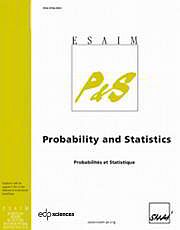Article contents
Nonparametric estimation of the derivatives of the stationarydensity for stationary processes
Published online by Cambridge University Press: 06 December 2012
Abstract
In this article, our aim is to estimate the successive derivatives of the stationarydensity f of a strictly stationary and β-mixing process (Xt)t≥0. This process is observed at discrete timest = 0,Δ,...,nΔ. Thesampling interval Δ can be fixed or small. We use a penalizedleast-square approach to compute adaptive estimators. If the derivativef(j) belongs to the Besov space \hbox{$\rond{B}_{2,\infty}^{\alpha}$} B2,∞α, then our estimator converges at rate (nΔ)−α/(2α+2j+1). Then we consider a diffusion with known diffusioncoefficient. We use the particular form of the stationary density to compute an adaptiveestimator of its first derivative f′. When the sampling intervalΔ tends to 0, and when the diffusion coefficient is known, theconvergence rate of our estimator is (nΔ)−α/(2α+1). When the diffusion coefficient is known, we alsoconstruct a quotient estimator of the drift for low-frequency data.
B2,∞α, then our estimator converges at rate (nΔ)−α/(2α+2j+1). Then we consider a diffusion with known diffusioncoefficient. We use the particular form of the stationary density to compute an adaptiveestimator of its first derivative f′. When the sampling intervalΔ tends to 0, and when the diffusion coefficient is known, theconvergence rate of our estimator is (nΔ)−α/(2α+1). When the diffusion coefficient is known, we alsoconstruct a quotient estimator of the drift for low-frequency data.
Keywords
- Type
- Research Article
- Information
- Copyright
- © EDP Sciences, SMAI, 2012
References
Références
- 6
- Cited by


